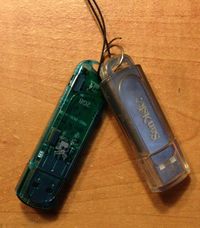Thumb drive
Dan Tobias (Talk | contribs) (Add image) |
Dan Tobias (Talk | contribs) (Yay... we're up to terabyte thumb drives!) |
||
| Line 5: | Line 5: | ||
}} | }} | ||
| − | A '''thumb drive''', or '''USB flash drive''', is a small device which can be inserted into a [[USB]] port in a computer or other electronic device in order to provide storage or transfer of data. It resembles a disk drive to the computer, but has no moving parts. They are widely used due to their compact size (smaller than a floppy disk or CD) and high storage capacity (as much as | + | A '''thumb drive''', or '''USB flash drive''', is a small device which can be inserted into a [[USB]] port in a computer or other electronic device in order to provide storage or transfer of data. It resembles a disk drive to the computer, but has no moving parts. They are widely used due to their compact size (smaller than a floppy disk or CD) and high storage capacity (as much as [http://www.kingston.com/us/company/press/article/6487 a terabyte] now). The memory is nonvolatile, so it will hold its data indefinitely just like a disk, and is freely readable and writable like a floppy or hard disk. |
Many varieties of thumb drives exist with different data capacities. | Many varieties of thumb drives exist with different data capacities. | ||
Revision as of 20:14, 8 January 2013
A thumb drive, or USB flash drive, is a small device which can be inserted into a USB port in a computer or other electronic device in order to provide storage or transfer of data. It resembles a disk drive to the computer, but has no moving parts. They are widely used due to their compact size (smaller than a floppy disk or CD) and high storage capacity (as much as a terabyte now). The memory is nonvolatile, so it will hold its data indefinitely just like a disk, and is freely readable and writable like a floppy or hard disk.
Many varieties of thumb drives exist with different data capacities.
Because the thumb drive is an electronic device with some in-built intelligence of its own which responds to read and write requests, it is possible to create "hacked" drives which do unusual things such as wipe themselves out if unwanted data retrieval events take place. Such techniques are discussed in a video lecture linked below.
References
- Wikipedia article
- Writing a thumbdrive from scratch: Video lecture describing "hacking" the low level of a thumb drive and its firmware and interfaces, for such purposes as hiding your data from forensic scans
